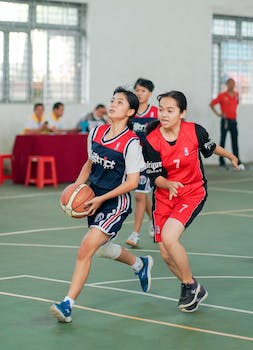
Sports and Education: The Role of Athletics in Schools and Colleges
As we delve into the world of education, it's essential to recognize the vital role that athletics play in the overall growth and development of students. The intersection of sports and education creates a unique platform for fostering essential life skills, promoting physical well-being, and encouraging academic success.
The Power of Sports in Education
Sports provide students with a plethora of opportunities to learn and grow. Through participating in athletics, students can develop teamwork, leadership, discipline, resilience, and time management skills. These skills are invaluable in their academic journey, as well as in their future professional lives.
Moreover, sports instill a sense of camaraderie among students. Whether it's working together as a team or competing against others, athletes learn to appreciate the value of collaboration, sportsmanship, and healthy competition. These values translate beyond the field and into their classrooms and communities.
The Impact on Physical and Mental Well-being
Regular physical activity has numerous health benefits, both physically and mentally. By engaging in sports, students can improve their cardiovascular health, enhance motor skills, and boost their overall fitness levels. This not only leads to a healthier lifestyle but also improves concentration and cognitive function, thereby positively influencing academic performance.
Beyond the physical benefits, participating in sports can also contribute significantly to mental well-being. Athletics provide an outlet for stress, allowing students to release tension and improve their mental resilience. Additionally, being a part of a sports team promotes a sense of belonging and community, reducing feelings of isolation and enhancing self-esteem.
Sports and Academic Success
Contrary to the misconception that sports can be a distraction from academics, numerous studies have demonstrated a positive correlation between sports participation and academic success. Engaging in sports helps students develop essential skills such as goal setting, time management, and perseverance, which can be applied directly to their academic pursuits.
Furthermore, the discipline required to balance sports and academics often leads to enhanced organizational skills and improved study habits. Athletes understand the importance of prioritization and are more likely to manage their time effectively, resulting in better academic performance.
The Role of Athletics in Schools and Colleges
Schools and colleges play a pivotal role in promoting athletics as an integral part of education. By providing robust sports programs, institutions foster an environment where students can explore their athletic abilities alongside their academic endeavors.
In addition to physical education classes, schools and colleges should offer a variety of sports teams that cater to different interests and skill levels. This inclusive approach ensures that every student has an opportunity to participate in sports, regardless of their abilities.
Moreover, schools and colleges should prioritize adequate resources for sports facilities and equipment. Well-maintained fields, gyms, and sports equipment not only improve the quality of training but also create an environment that motivates students to engage actively in sports.
The Importance of Balance
While sports offer numerous benefits, it is crucial to strike a balance between academic and athletic responsibilities. Educators and parents need to emphasize the significance of time management and encourage students to prioritize their academic commitments.
Achieving a balance between sports and education requires effective communication and collaboration between teachers, coaches, and parents. This collaborative effort ensures that students receive the necessary support to excel both on the field and in the classroom.
The Impact Beyond School Years
The impact of sports in education extends beyond the school years. The skills and values gained through athletic participation serve as building blocks for success in various aspects of life. Whether students continue their athletic pursuits at the collegiate or professional level, or transition into other fields, the lessons learned from sports remain invaluable.
In conclusion, the role of athletics in schools and colleges cannot be understated. Sports offer a unique opportunity for students to develop essential skills, promote physical and mental well-being, and enhance academic performance. It is the responsibility of educational institutions to prioritize and support athletics as an integral part of the holistic development of students.